Berlin was the last place Helga Melmed had expected to see again.
She was 14 when the Nazis forced her and her family onto a train from their home in the German capital to the Jewish ghetto in Lodz, Poland, in 1941.
That started a gruesome odyssey that later saw her imprisoned at Auschwitz and Neuengamme outside Hamburg before she was finally freed by British soldiers in 1945 from Bergen-Belsen in northern Germany, a 46-pound walking skeleton.
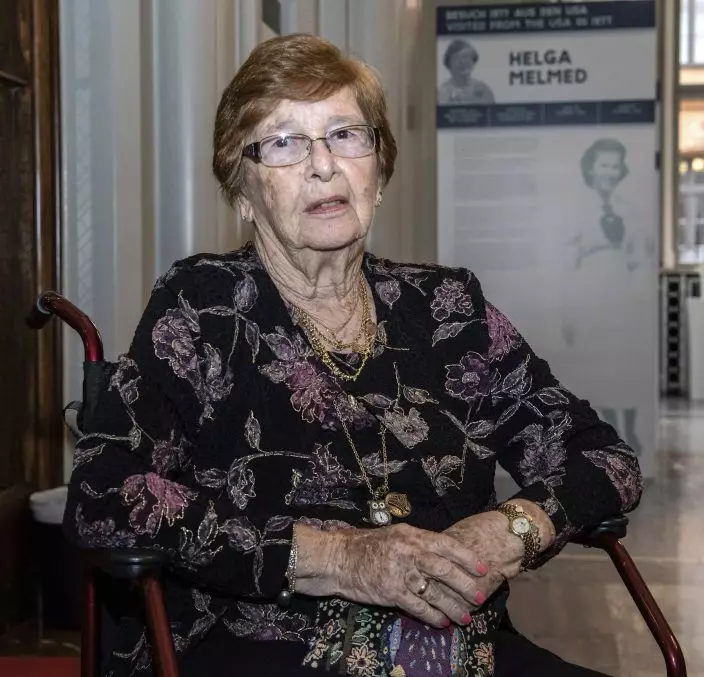
In this Wednesday Sept. 11, 2019 photo, Holocaust survivor Helga Melmed poses for a portrait during an event celebrating the 50th anniversary of a program for people expelled and persecuted by the Nazis and bringing tens of thousands of them back to their home city for one-week trips in Berlin. Helga Melmed was 14 years old when the Nazis forced her family on a train and deported her from her hometown of Berlin to the Jewish ghetto in Lodz in 1941 and she finally freed by British soldiers in 1945 from Bergen-Belsen. (Paul Zinkendpa via AP)
For years, she never considered returning to Germany until she was invited on a trip by the city of her birth, in a reconciliation program meant to help mend ties with former Berliners who had been forced out by the Nazis.
Now celebrating its 50th anniversary, the program has successfully brought people like Melmed on one-week trips to Berlin to reacquaint themselves with the city. Some 35,000 people have accepted the invitation since it was first issued in 1969, and while the numbers are dwindling a few new participants still come every year.
"I thought I'd never come back," Melmed, 91, who emigrated to the U.S. via Sweden after the war, told The Associated Press in an interview.
The "invitation program for former refugees" has brought back primarily Jewish emigrants who fled the Nazis, or those like Melmed who survived their machinery of genocide.
On Wednesday, she and other former program participants were invited to Berlin City Hall to celebrate the half-century anniversary.
At a ceremony mayor Michael Mueller thanked them for coming back — despite all they suffered at the hands of the Germans.
"Many people followed our invitation, people who had lost everything they loved," he said. "I want to express my strong gratitude to you for putting your trust in us."
Despite skepticism at the time that anyone persecuted by the Nazis would want to return, in 1970 — one year after the program's launch — there was already a waiting list of 10,000 former Berliners who wanted to come back for a visit.
More than 100 other German cities and towns have instituted similar programs but no municipality has brought back as many former residents as the capital.
Berlin, of course, also had the biggest Jewish community before the Holocaust. In 1933, the year the Nazis came to power, around 160,500 Jews lived in Berlin. By the end of World War II in 1945 their numbers had diminished to about 7,000 — through emigration and extermination.
All in all, some six million European Jews were murdered in the Holocaust.
Melmed's father was shot dead in the Lodz ghetto — where the Nazis concentrated Jews and forced them to work in factories — a few months after their arrival and her mother died of exhaustion a few months later, shortly after Melmed's 15th birthday.
Melmed, who lives in Venice, Florida, received her invitation under the reconciliation program 42 years ago.
"One day, out of the blue, I found a letter in the mailbox inviting me to come back for a visit," the retired nurse said at the hotel where she was staying with two of her four children and a grandson.
"So, in 1977, my husband and I traveled to Berlin."
They were part of an organized group tour of dozens of other former Berliners who had been persecuted by the Nazis.
"I don't know if the trip was a dream or a nightmare," Melmed said. One afternoon, she went for a coffee at Berlin's famous Kempinski Hotel — today called the Bristol Hotel — just like she used to do as a little girl with her mother and dad, a banking executive.
"It was heart-breaking," Melmed said.
Her life story is chronicled in the exhibition "Charter Flight into the Past" about the program, which opened Thursday at Berlin's City Hall and will run through Oct. 9.
Johannes Tuchel, the director of the German Resistance Memorial Center, which curated the exhibition, said that many returnees had conflicting emotions.
They didn't trust the Germans — especially in the early years of the program, when many people they saw in the streets still belonged to the Nazi generation. Often, memories of loss and pain were stirred up by the visit, but at the same time many were also able to reconnect with a city that harbored many happy childhood mementos for them.
For Melmed, closure came only at an old age. In 2018, when she turned 90, she decided to return once again to Berlin. It was then that she met the current tenants of her old family home in the Wilmersdorf neighborhood of Berlin. They invited her back into the apartment and organized a plaque-laying ceremony last week to commemorate her parents on this year's visit.
Last week, city officials presented her with her original birth certificate and her parents' marriage certificate.
"Now it's all closure for me," Melmed said with a peaceful smile as she touched her golden necklace with a Star of David pendant. "It doesn't hurt anymore."
PARIS (AP) — French President Emmanuel Macron warned Thursday that Europe could “die” if it fails to build its own robust defense as Russia’s war in Ukraine rages on, or if it fails to undertake major trade and economic reforms to compete with China and the U.S.
Macron urged Europeans to become more ambitious in a fast-changing world to face the challenges of war, fierce trade competition, energy scarcity, climate change and increasing authoritarianism.
In a nearly two-hour speech at Sorbonne University in Paris, Macron said that the continent is divided and “too slow and lacks ambition” at a time when the 27-member European Union needs to become a superpower, defend its own borders and speak with one voice if it wants to survive and thrive.
“Our Europe today is mortal,” Macron said. “It can die and that depends solely on our choices,” he added. He called on people to make those choices now because, “it’s today that Europe is between war and peace.”
Russia's full-scale invasion of Ukraine, now in its third year, is an existential threat and Europe isn't armed enough to defend itself when “confronted by a power like Russia that has no inhibitions, no limits,” Macron said.
‘Our ability to ensure our security is at stake," Macron said. “Russia mustn’t be allowed to win.”
Europe now has the “good fortune” of having the Biden administration’s commitment to supporting Ukraine, Macron said. But, in a year of key elections around Europe, in the U.S. and elsewhere, support may fragment or disappear entirely, he added.
“Europe must become capable of defending its interests, with its allies by our side whenever they are willing, and alone if necessary,” Macron said.
Strong armies, a European rapid intervention program and force, tanks, a missile shield and other weapons, produced in Europe, will need the support of “a joint diplomatic force that will speak with one voice and build bridges with Africa and Latin America,” the French leader said.
“Only then will Europe show that it's not a United States’ lap dog, and that it also knows how to talk to other regions of the world,” he said.
France has been a firm supporter of Ukraine in its fight against Russian aggression, and Macron has often clashed with other Western leaders as he has insisted that Europe must stand by the country at any cost. The French president alarmed European leaders by saying recently that sending Western troops into Ukraine to shore up its defenses shouldn’t be ruled out.
Referring to trade practices of China and the U.S., Macron said “the two world powers have decided not to respect the rules of global trade” by shoring up protections and subsides while Europe’s industry remains open and is stuck in overregulation.
“Let’s do the same, we are in competition,” Macron said.
“We must buy faster, we must produce more and we must buy more that is made in Europe. That is key,” Macron said.
Thursday's speech came less than two months before a pivotal European Parliament election.
Macron, an avid advocate of a united and assertive Europe, also rallied support for his centrist Renaissance party before the June 6-9 vote as far-right parties lead the moderate coalitions in the polls. He called for safeguarding democratic values as the “authoritarian model” was becoming “more popular” across the continent.
The war in Ukraine and immigration are top priorities for European Union voters, according to polls. Far-right parties have gained support by criticizing Macron’s government policies on both issues. Macron acknowledged divisions on immigration policies, including on asylum and deportation rules for those who have arrived to Europe illegally.
He emphasized the need for an effective response and Europe-wide coordination for curbing illegal immigration, closer cooperation with immigrants' countries of origin and a unified, relentless fight against human traffickers.
Macron criticized the idea of striking an agreement, as Britain as done, with countries in Africa and elsewhere to transfer immigrants there.
“This is a betrayal of our values that ultimately leads us to dependency on other counties,” Macron said.
The British government earlier this week approved a law allowing the deportation of some migrants who enter the country illegally to Rwanda.
Macron lost his majority in France’s most influential house of parliament, the National Assembly, after the 2022 election to the far-left coalition and the far-right National Rally party.
The social situation in France remains tense as Paris prepares to host the Olympic Games this summer, amid protests from teachers and police officers, and farmer demonstrations in recent weeks. The protests follow huge rallies last year against Macron’s ultimately successful proposal to increase the retirement age from 62 to 64.
Barbara Surk reported from Nice, France. Lorne Cook contributed to this report from Brussels.
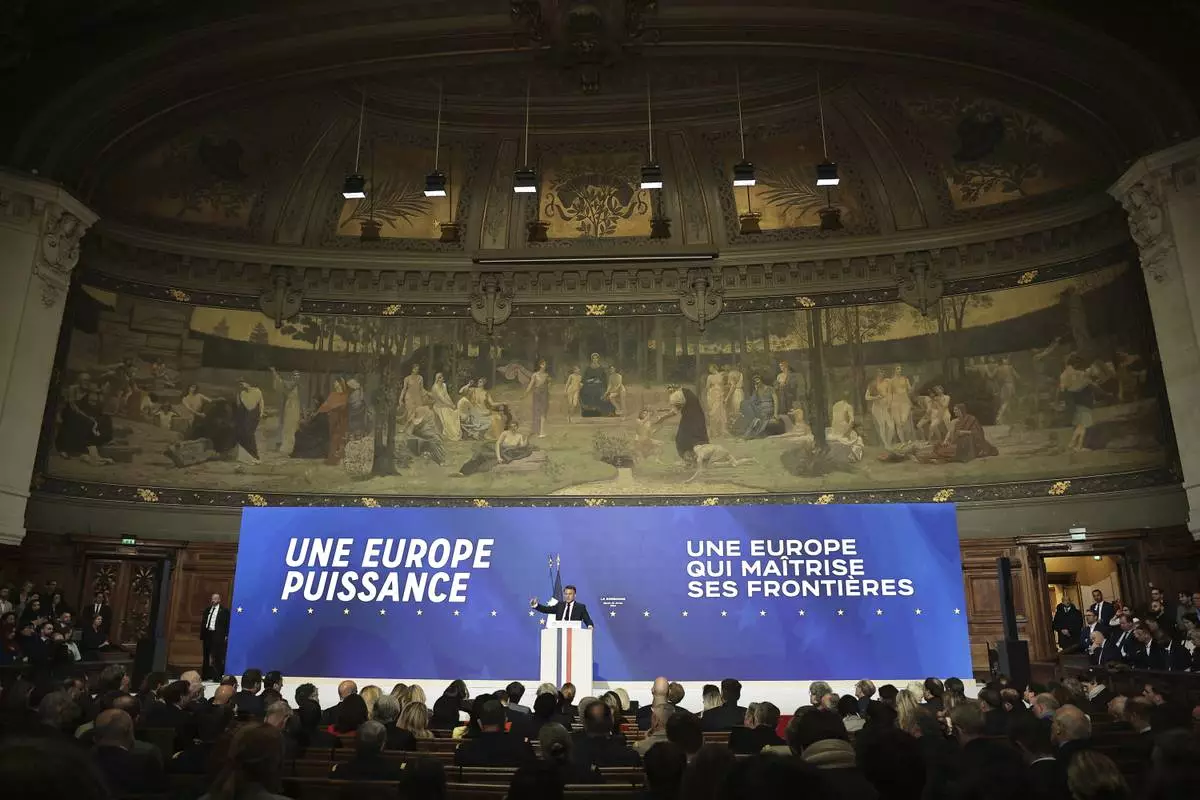
French President Emmanuel Macron delivers a speech on Europe in the amphitheater of the Sorbonne University, Thursday, April 25 in Paris. 2024. French President Emmanuel Macron will outline his vision for Europe as a more assertive global power at the backdrop of war in Ukraine, security, and economic challenges in a speech ahead of pivotal election for the European Parliament in June. (Christophe Petit Tesson, Pool via AP)
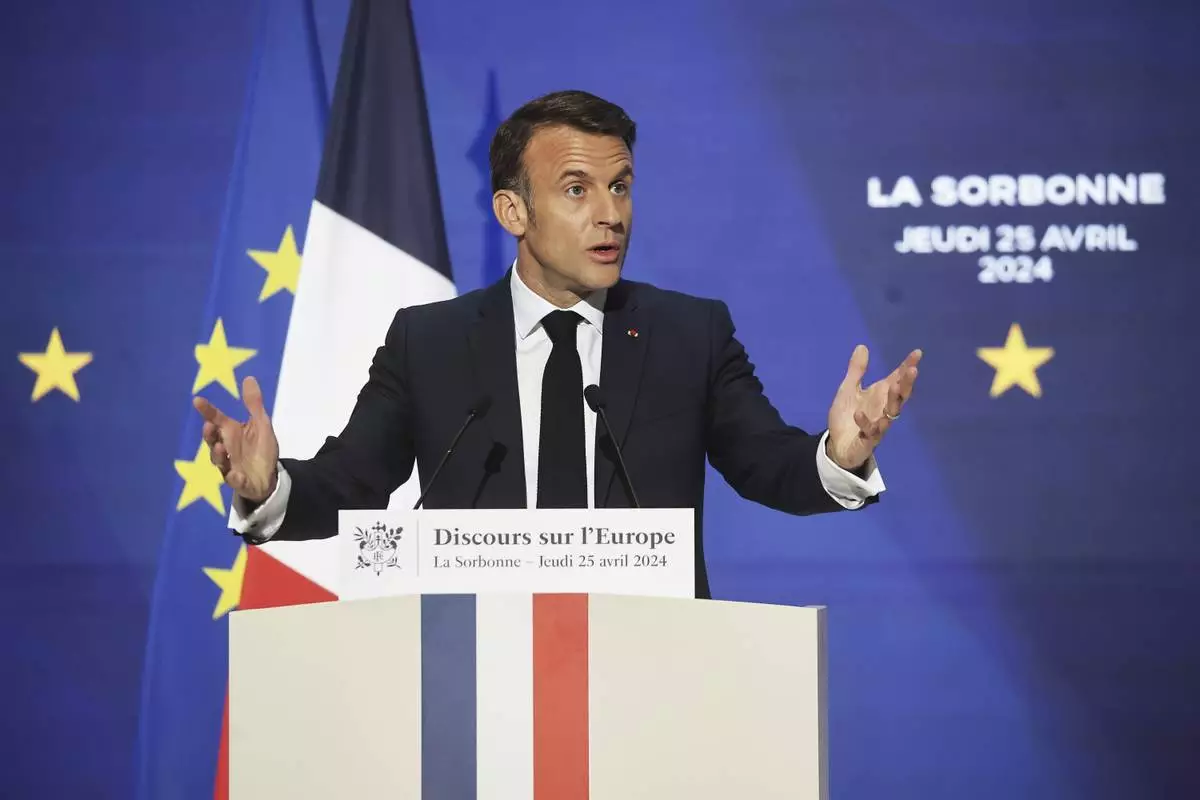
French President Emmanuel Macron delivers a speech on Europe in the amphitheater of the Sorbonne University, Thursday, April 25 in Paris. 2024. French President Emmanuel Macron will outline his vision for Europe as a more assertive global power at the backdrop of war in Ukraine, security, and economic challenges in a speech ahead of pivotal election for the European Parliament in June. (Christophe Petit Tesson, Pool via AP)
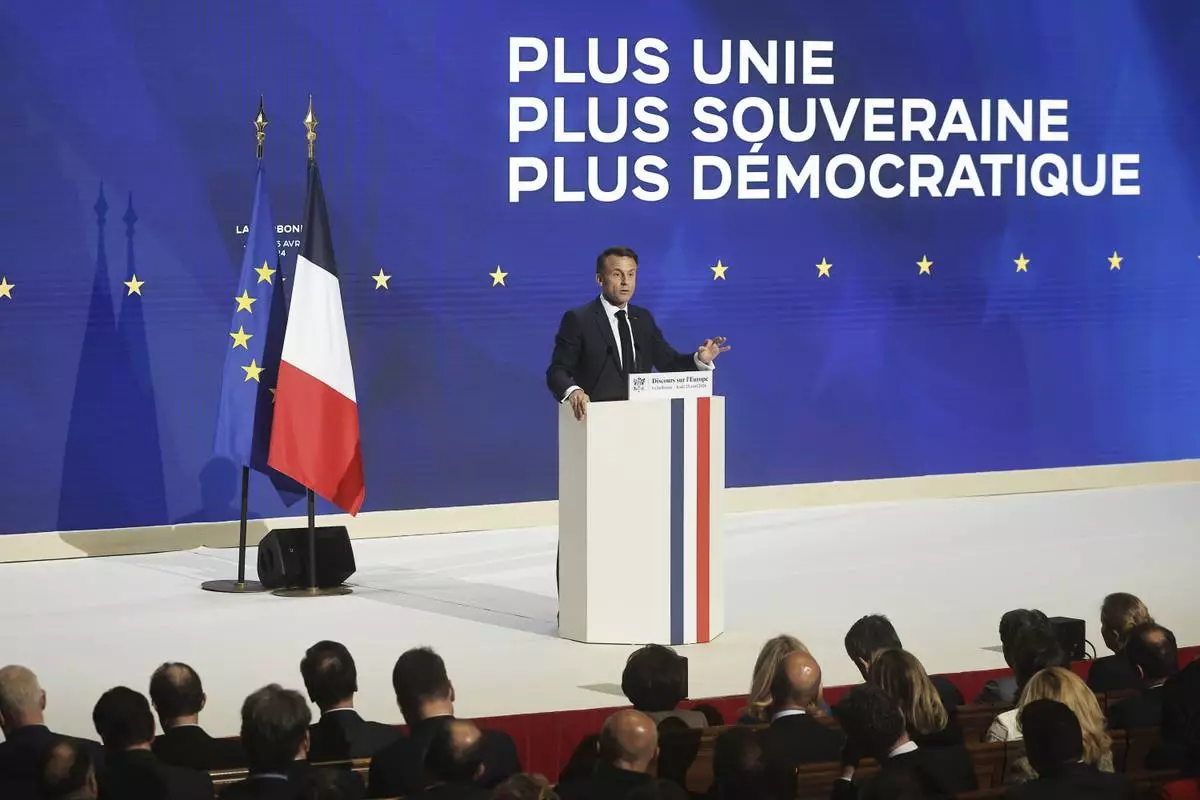
French President Emmanuel Macron delivers a speech on Europe in the amphitheater of the Sorbonne University, Thursday, April 25 in Paris. 2024. French President Emmanuel Macron will outline his vision for Europe as a more assertive global power at the backdrop of war in Ukraine, security, and economic challenges in a speech ahead of pivotal election for the European Parliament in June. (Christophe Petit Tesson, Pool via AP)
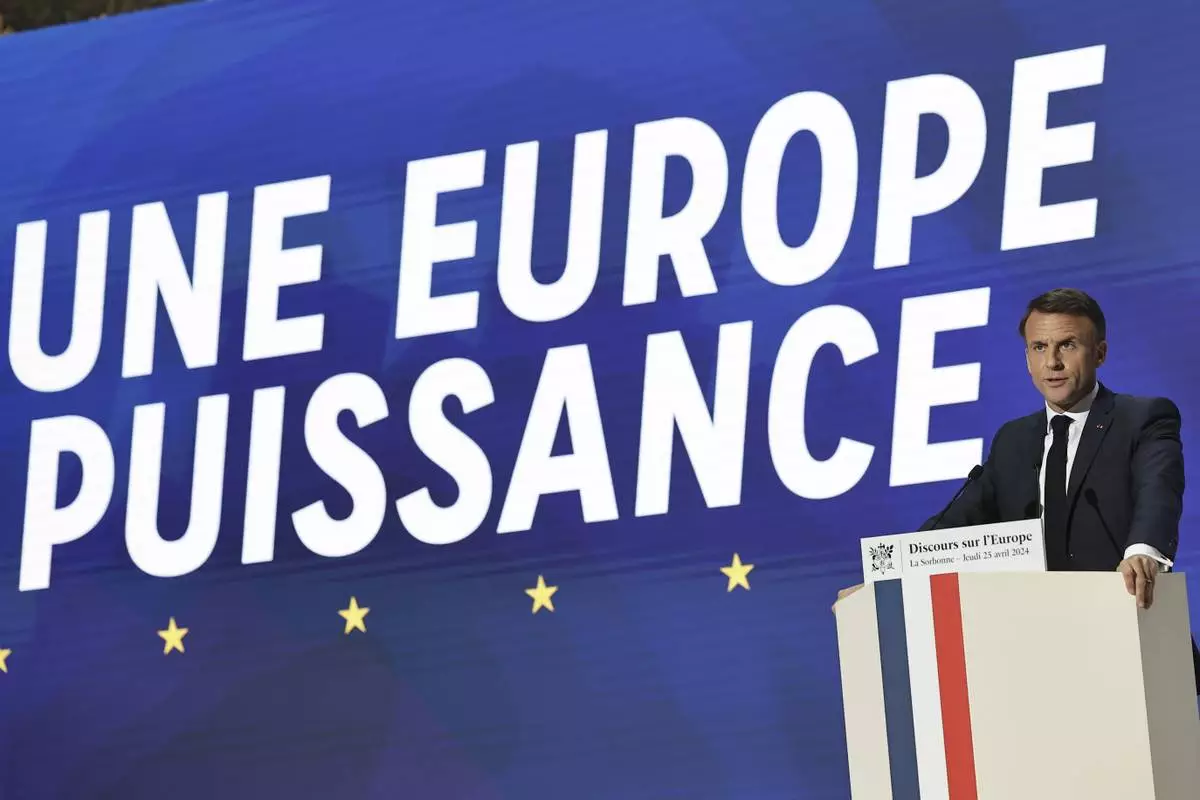
French President Emmanuel Macron delivers a speech on Europe in the amphitheater of the Sorbonne University, Thursday, April 25 in Paris. 2024. French President Emmanuel Macron will outline his vision for Europe as a more assertive global power at the backdrop of war in Ukraine, security, and economic challenges in a speech ahead of pivotal election for the European Parliament in June. (Christophe Petit Tesson, Pool via AP)
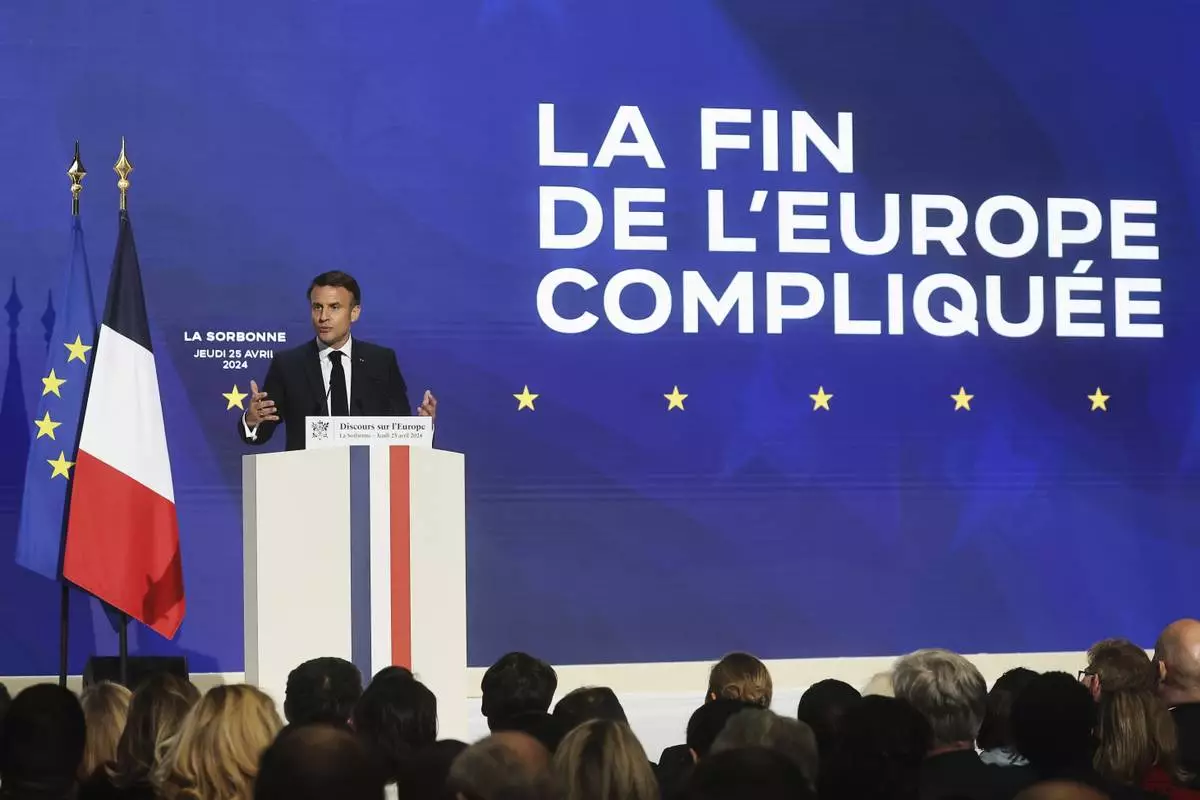
French President Emmanuel Macron delivers a speech on Europe in the amphitheater of the Sorbonne University, Thursday, April 25 in Paris. 2024. French President Emmanuel Macron will outline his vision for Europe as a more assertive global power at the backdrop of war in Ukraine, security, and economic challenges in a speech ahead of pivotal election for the European Parliament in June. (Christophe Petit Tesson, Pool via AP)
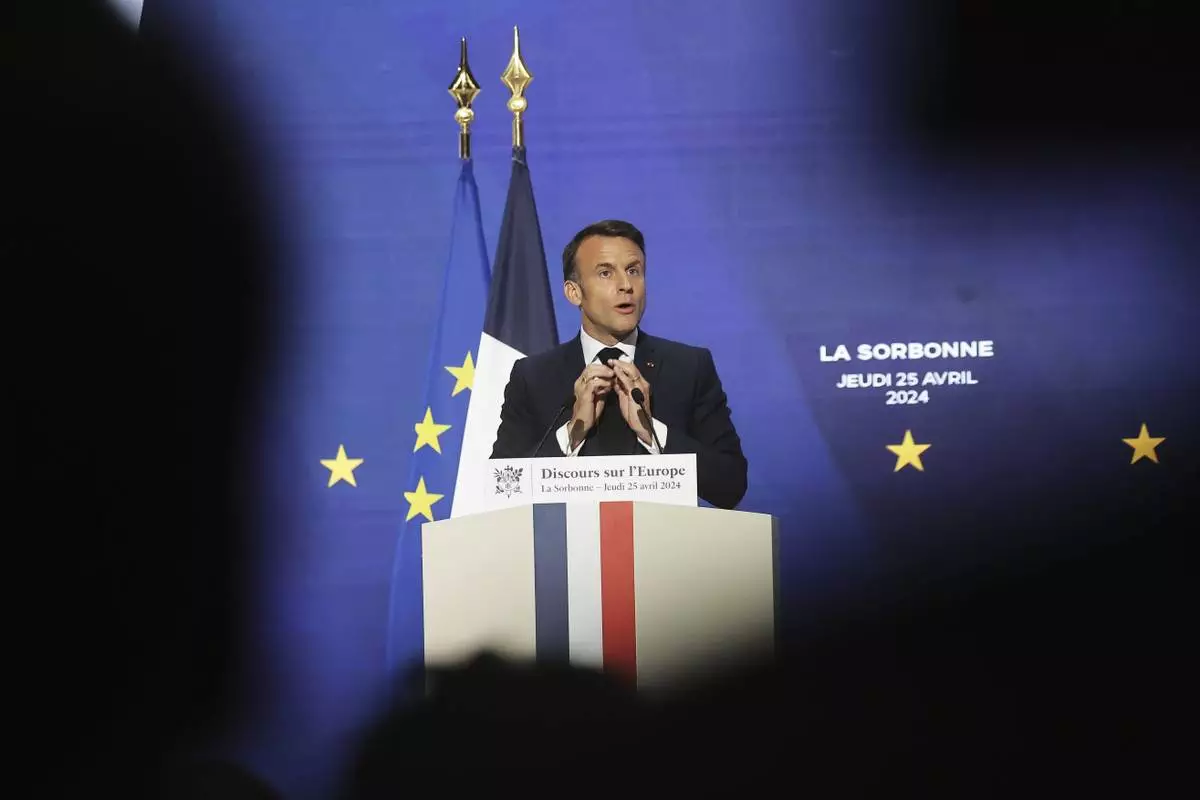
French President Emmanuel Macron delivers a speech on Europe in the amphitheater of the Sorbonne University, Thursday, April 25 in Paris. 2024. French President Emmanuel Macron will outline his vision for Europe as a more assertive global power at the backdrop of war in Ukraine, security, and economic challenges in a speech ahead of pivotal election for the European Parliament in June. (Christophe Petit Tesson, Pool via AP)
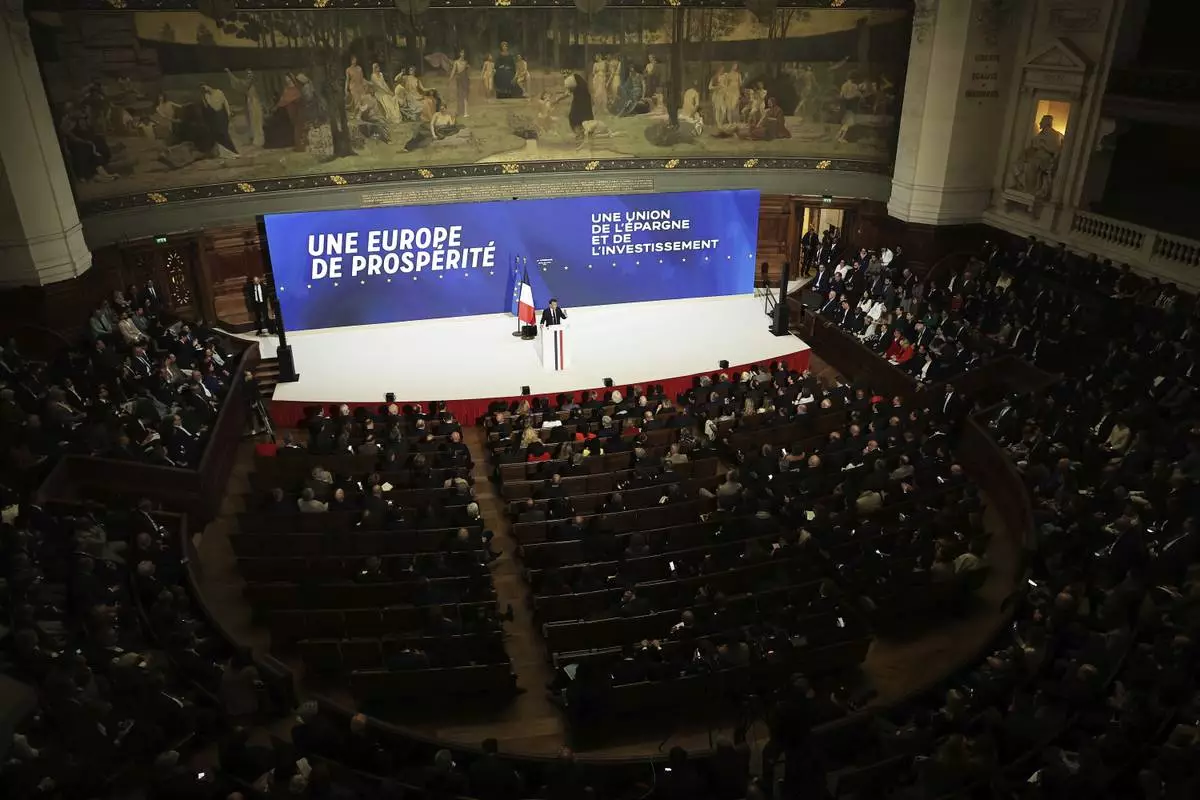
French President Emmanuel Macron delivers a speech on Europe in the amphitheater of the Sorbonne University, Thursday, April 25 in Paris. 2024. French President Emmanuel Macron will outline his vision for Europe as a more assertive global power at the backdrop of war in Ukraine, security, and economic challenges in a speech ahead of pivotal election for the European Parliament in June. (Christophe Petit Tesson, Pool via AP)
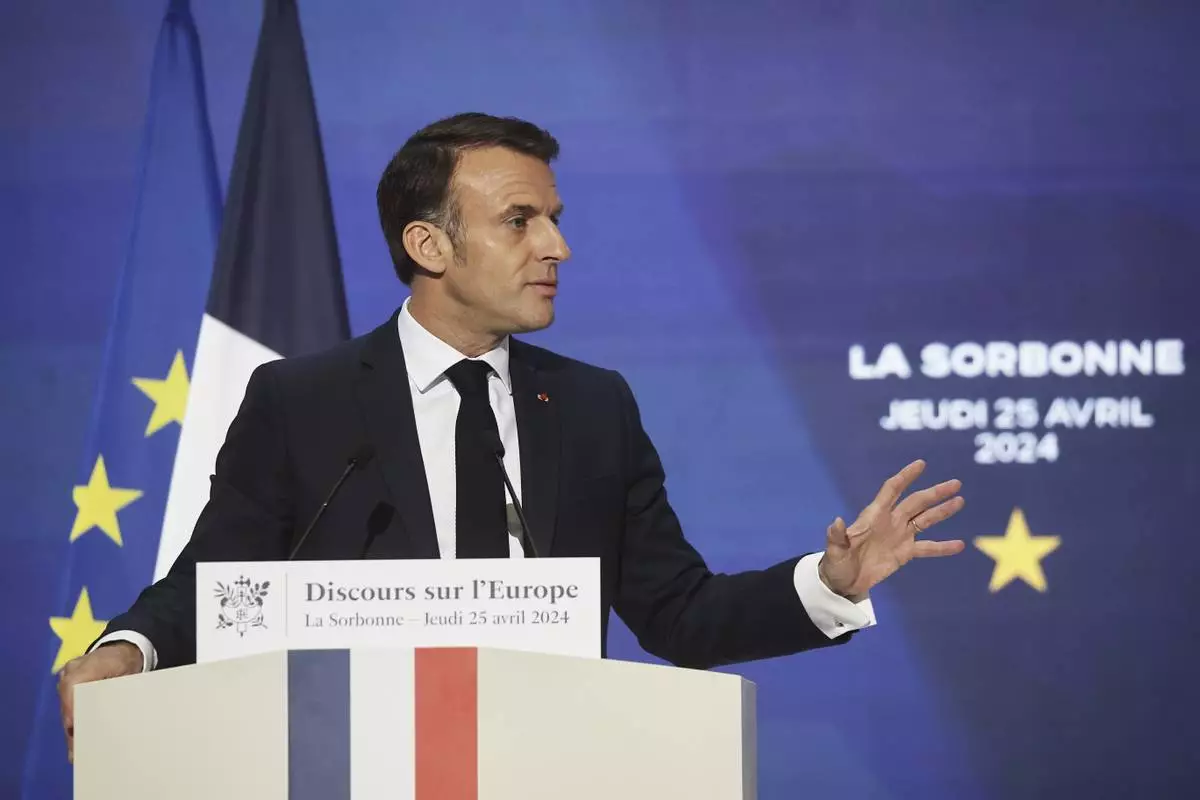
French President Emmanuel Macron delivers a speech on Europe in the amphitheater of the Sorbonne University, Thursday, April 25 in Paris. 2024. French President Emmanuel Macron will outline his vision for Europe as a more assertive global power at the backdrop of war in Ukraine, security, and economic challenges in a speech ahead of pivotal election for the European Parliament in June. (Christophe Petit Tesson, Pool via AP)
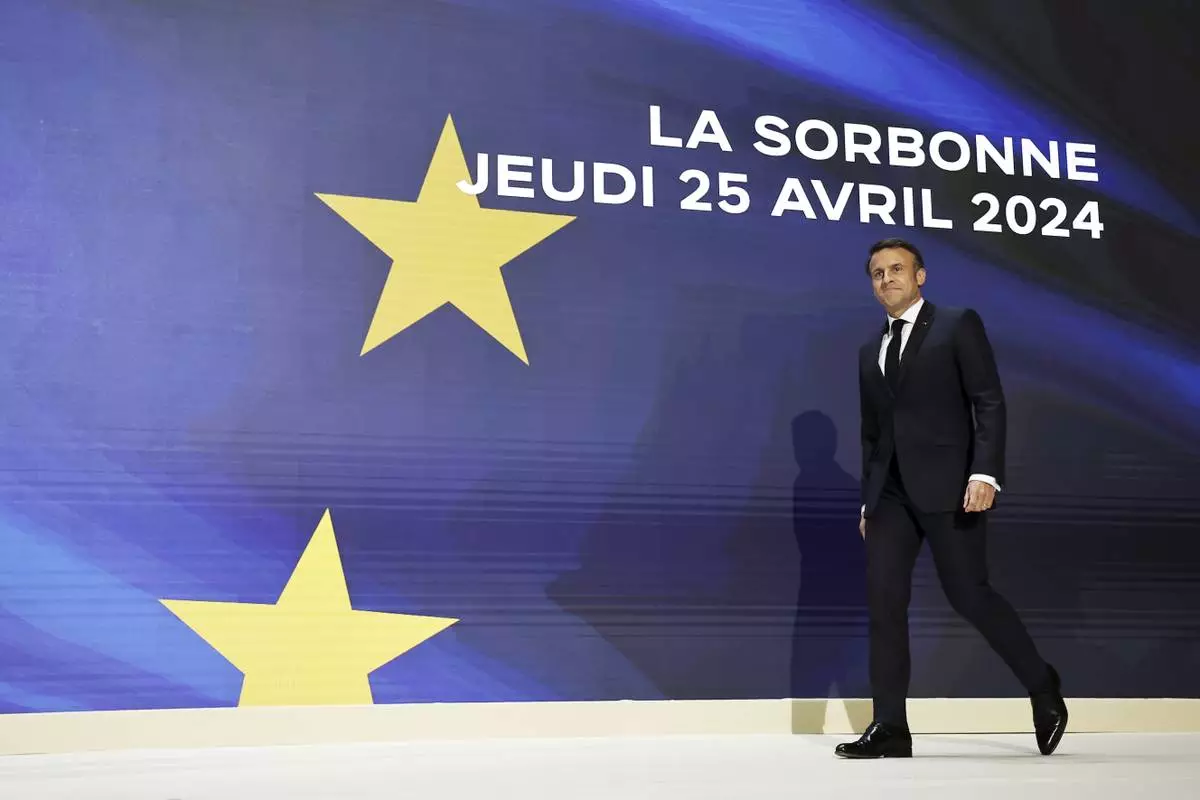
French President Emmanuel Macron arrives to deliver a speech on Europe in the amphitheater of the Sorbonne University, Thursday, April 25 in Paris. 2024. French President Emmanuel Macron will outline his vision for Europe as a more assertive global power at the backdrop of war in Ukraine, security, and economic challenges in a speech ahead of pivotal election for the European Parliament in June. (Christophe Petit Tesson, Pool via AP)
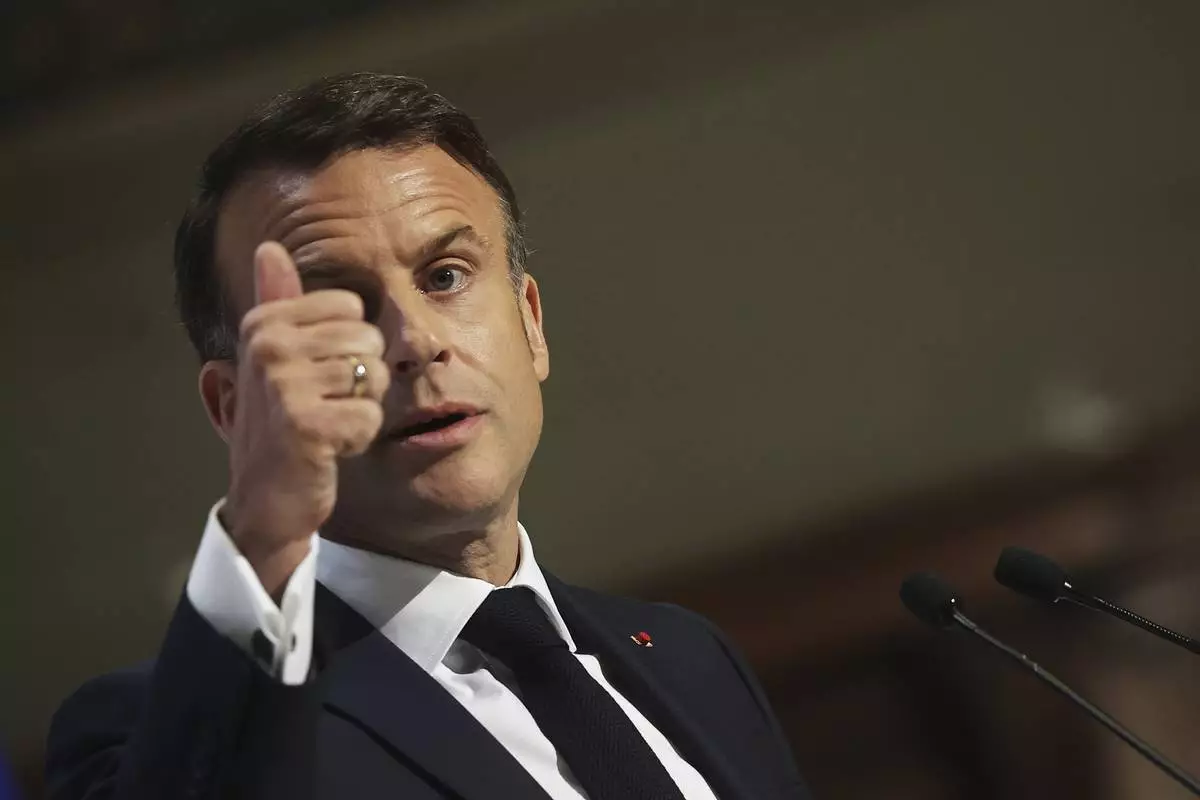
French President Emmanuel Macron delivers a speech on Europe in the amphitheater of the Sorbonne University, Thursday, April 25 in Paris. 2024. French President Emmanuel Macron will outline his vision for Europe as a more assertive global power at the backdrop of war in Ukraine, security, and economic challenges in a speech ahead of pivotal election for the European Parliament in June. (Christophe Petit Tesson, Pool via AP)
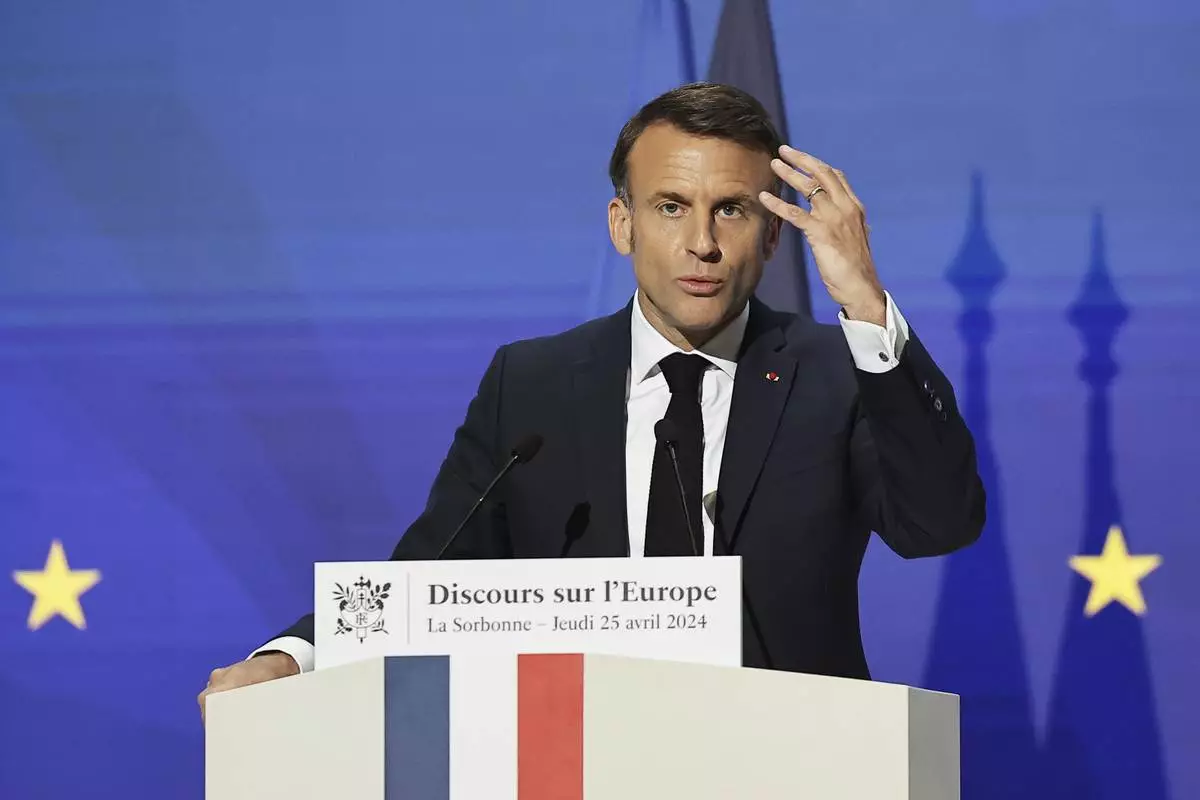
French President Emmanuel Macron delivers a speech on Europe in the amphitheater of the Sorbonne University, Thursday, April 25 in Paris. 2024. French President Emmanuel Macron will outline his vision for Europe as a more assertive global power at the backdrop of war in Ukraine, security, and economic challenges in a speech ahead of pivotal election for the European Parliament in June. (Christophe Petit Tesson, Pool via AP)
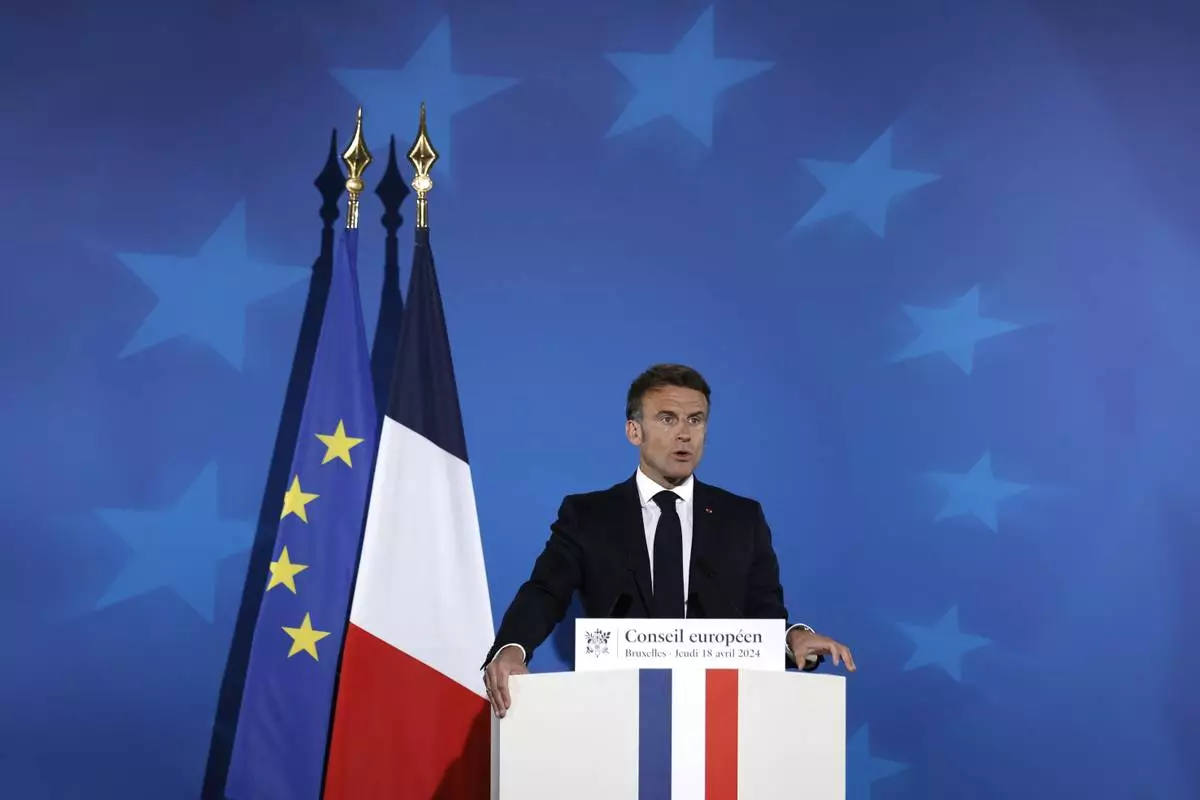
French President Emmanuel Macron speaks during a media conference at an EU summit in Brussels, Thursday, April 18, 2024. European Union leaders on Wednesday debated a new "European Competitiveness Deal" aimed at helping the 27-nation bloc close the gap with Chinese and American rivals amid fears the region's industries will otherwise be left behind for good. (AP Photo/Omar Havana)






















